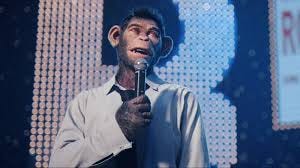The Heavy Entertainment Show
With his latest film, Better Man, director Michael Gracey follows up his previous effort, the international smash hit The Greatest Showman, with another elaborate musical biopic, this time focusing on Robbie Williams, the British singer who rose from obscurity to become one of the biggest pop stars in the world, with the notable exception of America. Although Williams may not be a known commodity to most stateside audiences, the narrative presented here is familiar enough, at least in the broad strokes. We see Robbie as a young lad who, with the encouragement of his mother (Kate Mulvaney) and doting grandmother (Alison Steadman), dreams of one day being a star partly out of his need for acceptance and partly as a way of trying to connect to the father (Steve Pemberton) who walked out on them in order to pursue his own dreams of Sinatra-like fame. We see him audition for and land a spot in the new boy band Take That, a gig that leads to great fame but which soon grows south when battles with an overbearing manager and issues regarding creative control and his spiraling drug abuse lead to him getting booted from the group. We see him trying to rebuild his professional and personal lives with a solo career and a relationship with fellow singing star Nicole Appleton (Raechelle Banno) and while things go well for a while, he once again is undone by problems with drugs, jealousy and self-doubt until he finally finds the strength to confront them all at last, just in time for a triumphant climactic concert at the Royal Albert Hall, including, perhaps inevitably, an extended rendition of “My Way.” The one slight deviation from the standard biopic formula is that throughout the course of the film, Williams is depicted throughout as a CGI monkey played via motion-capture technology by actor Jonno Davies and voiced by Williams himself.
As conceits go, doing a pop star biopic where your central character is represented by a refugee from the recent Planet of the Apes movies and which is never remarked upon or even acknowledged by the rest of the the otherwise all-human cast is an undeniably nervy move, I suppose and it does lend a certain amount of juice to the proceedings in the early going, even if much of it comes from the sheer disbelief that people actually invested what is clearly a sizable chunk of change on such a daffy concept. However, as the film goes on, it becomes increasingly obvious that the film has no intentions of using it as some way of serving as a metaphor for the alienation that Williams felt as someone yearning for fame and for the love of his largely absent father and is content to simply run through the standard rock star biopic template with an ape being the one doing drugs and having threesomes with groupies. Once the initial shock of the simian element wears off—which comes pretty quickly—it becomes apparent that Williams’s story is not monumentally interesting on its own. To be fair, a couple of the production numbers are staged with the same kind of flashy bravado that Gracey brought to The Greatest Showman (the best one being the touching sequence when Williams first meets Appleton and they have a dance number that includes flash-forwards to their subsequent roller-coaster relationship) and I suppose that if you are a fan of Williams, you might get more out of this than newcomers to his oeuvre. Although certainly better than Back in Black and not quite as disappointing as A Complete Unknown, Better Man, for all its surface audaciousness, is more peculiar than anything else but, unfortunately, not nearly peculiar enough to be interesting
.Hard Truths is a film that asks viewers to spend 97 minutes observing one of the angriest and most unpleasant people to ever stand at the center of a movie. The person in question is Pansy (Marianne Jean-Baptistery), a British woman whose entire existence appears to consist solely of loudly and angrily berating virtually anyone who comes shouting distance of her—everyone from family members like her quiet husband Curtley (David Webber), bullied son Moses (Tuwaine Barrett) and infinitely more cheerful sister Chantelle (Michele Austin) to her doctor to the guy asking her if she is going to be vacating her parking spot. At first, her extended and highly articulate rants have an amusing appeal reminiscent of any number of the characters played by John Cleese on Monty Python’s Flying Circus but as the film goes on, it soon becomes clear that Pansy is caught up in the throes of clinical depression and no one has been able to penetrate the wall of rage that she has erected to convince her that she needs help.
This may not sound like a particular fun movie to sit through, I admit, but I promise you that it is an undeniably fascinating and compelling work nevertheless. The film was written and directed by celebrated British auteur Mike Leigh, whose best films—such as High Hopes, Life is Sweet and Naked—demonstrate a remarkable empathy for his characters, preferring to observe them rather than passing a condescending form of judgement upon them or by trying to rationalize their behaviors in simplistic terms. In the case of Pansy, we get hints here and there of the hurts that Pansy has endured in the past to make her who she is now but wisely eschews offering any concrete explanations or simplistic solutions, preferring to take her entirely on her terms. What really makes the film so gripping and ultimately heartbreaking is the performance by Jean-Baptiste, marking her first collaboration with Leigh since her Oscar-nominated work in Secrets and Lies and delivering one of the most searing and unforgettable turns in recent memory. While her tirades are so brutal that you almost want to turn away from the screen at some times, she manages at the same time to quietly suggest the unacknowledged pain that she is clearly going through so that even as you recoil from her cruelties, you feel some degree of sympathy for her for the clearly unacknowledged pain that she is in the throes of that compels her to behave as she does to such an extent that she can barely choke out a simple “thank you.” Hard Truths may not be a lot of fun—though it does have some funny moments here and there—but it is a fascinating and quietly humane work from one of the best filmmakers around that is as good as anything that he has done before
.At the beginning of The Room Next Door, the latest work from Pedro Almodovar and his first English-language film, novelist Ingrid (Julianne Moore) is doing a book signing of her latest tome when she learns that Martha (Tilda Swinton), a former colleague at a magazine back in the day who went on to become a war correspondent, is dealing with cervical cancer. Ingrid makes the pilgrimage to see Martha and a relationship that was once close enough that they both ended up dating the same guy—another author played by John Turturro—is gradually renewed. As they spend more time together, Martha eventually makes an important request of Ingrid—now that her cancer has returned, she has illegally obtained a euthanasia pill and while she doesn’t need Ingrid to help her administer it or anything else that could make her legally liable, she would like for her to be in the house in an adjacent room on the night that she finally decides to go through with it as a way of comforting herself during her transition. This is a big ask, of course, but after some initial resistance, Ingrid agrees and the two stay together at Martha’s home in upstate New York to await the moment when she decides that the time has arrived to go through with her plan.
This is a film that seems to have everything going for it—it is based on an acclaimed 2020 novel by Sigrid Nunez, it has been adapted by one of the most world-renowned filmmakers around working with the kind of melodramatic material that seems to be right up his alley and stars two of the best actresses around in what is essentially a two-woman show—and therefore, it is all the more mystifying to discover that it doesn’t quite click. Outside of an initially intriguing conflict about how Martha’s request to Ingrid runs up against their diametrically opposite approaches to the concept of death—Ingrid has intellectualized her thoughts on the subject to such an extent that she initially can only relate to it as fodder for her books while Martha, thanks to her first-hand experiences seeing it in the field of battle, has a far more personal connection to it—Almodovar seems oddly disengaged from the material, largely resisting the opportunity to delve into the concepts of life, death, happiness and the mysterious nature of adult friendships. Instead, we get a number of awkwardly-written scenes with stilted dialogue that even actresses as gifted as Swinton and Moore are unable to quite make sound convincing. Whether this is the result of Almodovar working in an unfamiliar language, I cannot say but although it is certainly stylish from a visual perspective, The Room Next Door is a film that takes material that should have been absolutely heartbreaking to regard and renders it in such chilly and awkward terms that it seems to be going out of its way to keep viewers from ever really connecting with it.






